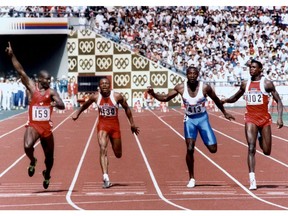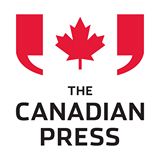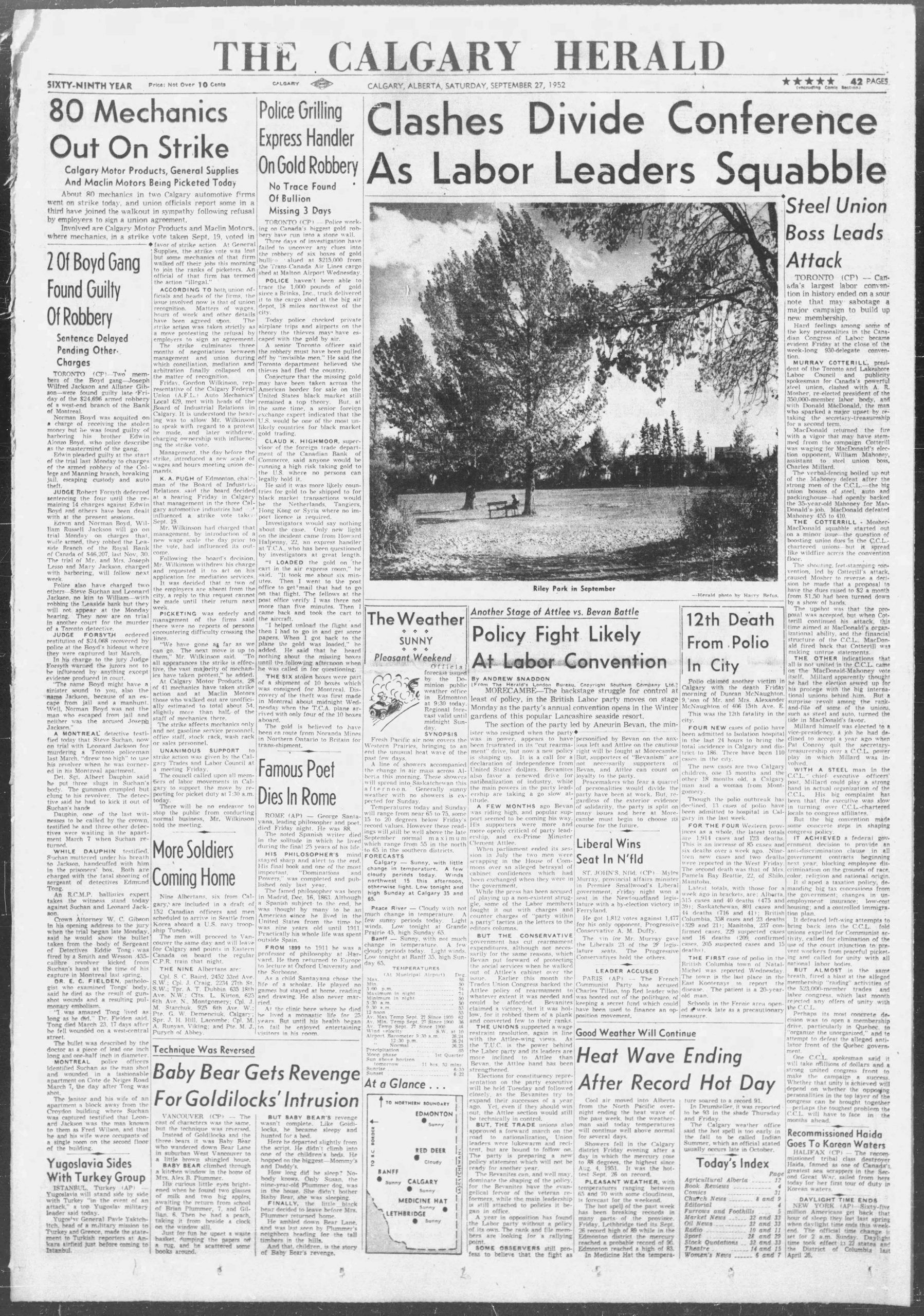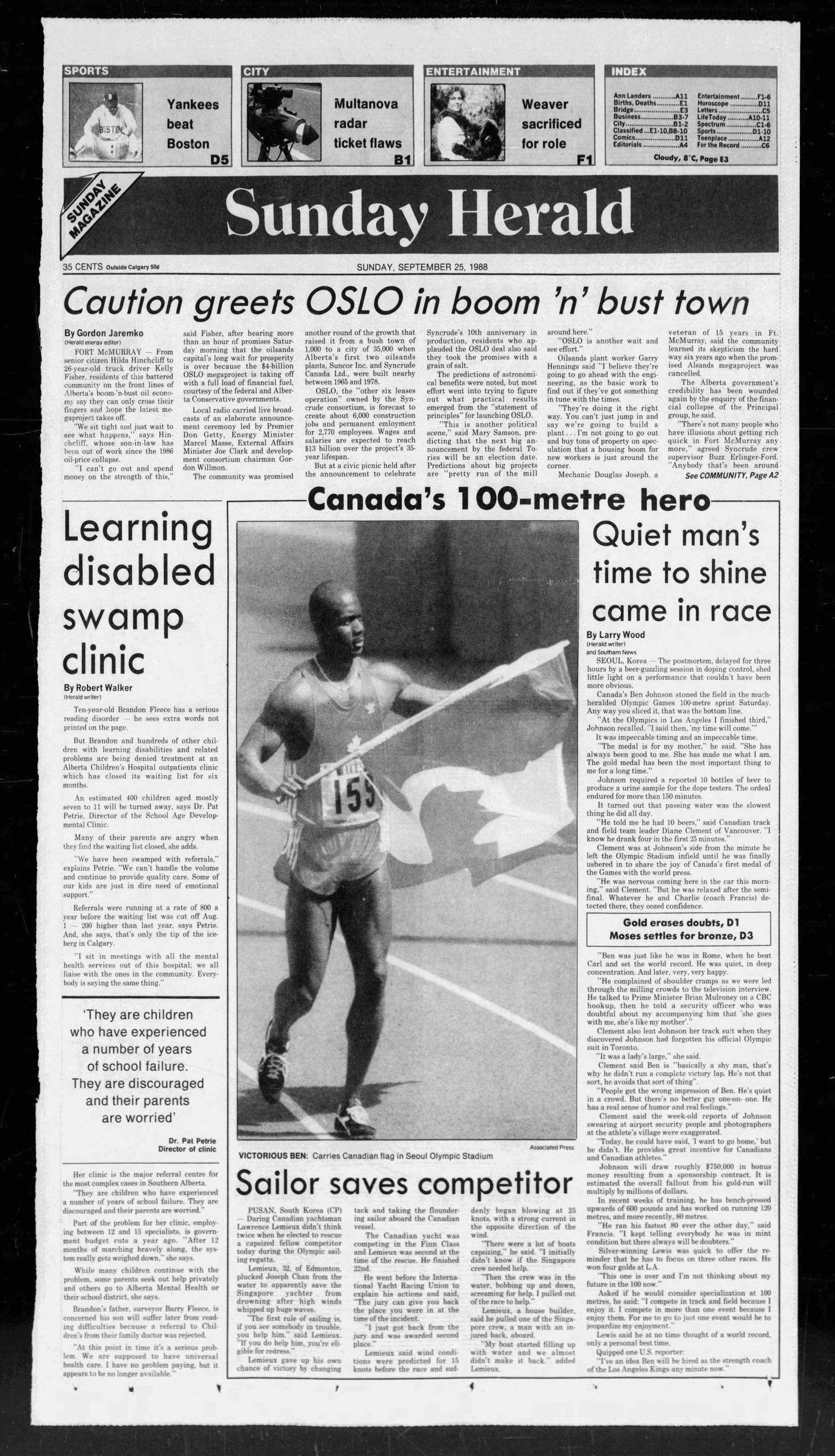Today in history: Babe Ruth's farewell, a mysterious gold heist and Ben Johnson's tarnished Olympic win

Article content
On this day, Sept. 24, in history:
In 787, the Second Nicene Council opened under Pope Hadrian I. Numbered by some as the seventh of the church’s 21 ecumenical councils, Nicea II condemned iconoclasm, the belief that the veneration of Christian images and relics is idolatry.
In 1621, the first news-sheet in English was printed in England. It had no name, but is considered the beginning of English journalism.
In 1780, Benedict Arnold escaped one day after his treason was disclosed. Arnold, a major-general and commander of the American fort West Point, had planned to surrender the fort to the British. He became a colonel in the British army and later lived in Saint John, N.B., where he engaged in business for four years. He then returned to England, where he died in 1801.
In 1788, Canada made its first shipment of furs to China.
In 1869, the Black Friday panic hit Wall Street after an attempt by financiers Jay Gould and James Fisk to corner the gold market. Gold prices tumbled when the U.S. Treasury announced it would sell $4 million in gold.
In 1870, Georges Claude, an engineer who devised a process for liquefying air, was born in Paris.
In 1872, the Chess Federation of Canada, the highest-ranking chess organization in the country, was founded in Hamilton.
In 1889, in The Netherlands, the “Declaration of Utrecht” was signed and became the doctrinal basis of the Old Catholic Church. Old Catholics reject clerical celibacy, papal authority and the Council of Trent decisions. Today in Europe, Old Catholics are active in the Netherlands, Germany and Switzerland.
In 1896, F. Scott Fitzgerald, the American novelist famous for his depictions of the Jazz Age, was born in St. Paul, Minn. He wrote his first novel, This Side of Paradise, at the age of 24. His most famous book, The Great Gatsby, is considered one of the great examples of American literature. Fitzgerald died in 1940 in the midst of writing a novel about Hollywood that was to be his comeback from personal problems caused by financial setbacks and his wife’s insanity.
In 1904, Toronto’s George Lyon won the golf title at the St. Louis Olympics. The 46-year-old eccentric walked to the award ceremony on his hands. It was the last time golf was an Olympic sport before being reinstated for the 2016 Olympics, won by Britain’s Justin Rose.

In 1912, Sir Richard John Cartwright, Canada’s first Liberal finance minister, died in Kingston, Ont., at age 76. He came from a rich and powerful family. A loyalist, he was educated at Trinity College in Dublin, but he did not take a degree from the prestigious school. Backed by his family, he went into business. He entered politics in 1863 and went on to represent various constituencies in Ontario. Cartwright split from Sir John A. Macdonald’s Conservative party in 1869, sitting as an Independent until 1873, when he joined the Liberals. He became a powerful member of the party and cabinet and strongly pushed for a free trade deal with the United States. He was finance minister from 1873-78 and minister of trade and commerce from 1896-1911.
In 1934, Babe Ruth made his farewell appearance as a regular player with the New York Yankees in a game against the Boston Red Sox. The Red Sox won 5-0.

In 1950, a Canadian military mission arrived in Tokyo to become the first Canadian unit dispatched in the Korean conflict.
In 1952, six boxes of gold bullion worth $215,000 were stolen from an unguarded building at the Toronto airport. The gold, awaiting shipment to Montreal, was never found but it was believed to have eventually been smuggled to Hong Kong and China.
In 1956, Canada, Britain and the United States signed an atomic energy agreement in Washington.
In 1957, the Brooklyn Dodgers played their last home game at Ebbets Field in New York, defeating the Pittsburgh Pirates 2-0. The Dodgers moved to Los Angeles at the start of the 1958 season, becoming the first West Coast baseball team.
In 1959, four years after quitting the NDP, Ross Thatcher was elected leader of the Saskatchewan Liberal party. He later became premier.
In 1960, the USS Enterprise, the first nuclear-powered aircraft carrier, was launched.
In 1962, the Garden of the Provinces in Ottawa was opened by Prime Minister John Diefenbaker.
In 1970, Luna 16 returned to the Soviet Union, ending the first unmanned trip to the moon.
In 1971, the British government expelled 90 officials from the Soviet Embassy and refused entry to 15 others. A former member of the KGB defected to Britain and implicated the expelled officials in espionage.
In 1975, the U.S. Senate intelligence committee announced the CIA had been opening foreign letters addressed to Americans for 20 years.
In 1976, newspaper heiress Patricia Hearst was sentenced to seven years in prison for her part in a 1974 bank robbery. She was released after 22 months under an executive clemency order from U.S. President Jimmy Carter.

In 1984, Queen Elizabeth and Prince Philip began a 14-day Canadian tour.
In 1988, Canadian Ben Johnson set a world record in the 100-metre sprint at the Summer Olympic Games in Seoul, South Korea. Johnson clocked 9.79 seconds and won the much-anticipated showdown against his arch-rival American Carl Lewis. But Johnson’s glory was short-lived. Several days later, he was stripped of his gold medal — which went to Lewis — after testing positive for banned anabolic steroids. The scandal led to the Dubin commission, a federal inquiry into drug use in amateur sport. (Jamaica’s Usain Bolt lowered his own 100-metre record with a 9.58 at the 2009 world championships in Berlin.)
In 1991, Theodore Geisel, who wrote under the pen name Dr. Seuss, died at age 87.
In 1993, Prince Norodom Sihanouk reclaimed the Cambodian throne he abdicated four decades earlier and was sworn in as king. He also signed into law a new constitution officially proclaiming war-ravaged Cambodia a democratic and constitutional monarchy.
In 1993, in a speech to the United Nations, African National Congress leader Nelson Mandela called for a lifting of economic sanctions against South Africa. Canada, the United States and Commonwealth nations subsequently removed all trade, investment and financial embargoes against the country.
In 1996, Justice Jean Bienvenue resigned from the Quebec Superior Court, avoiding the possibility of becoming the first federally appointed judge in Canadian history to be fired. Bienvenue had raised a storm of controversy when he said during a murder trial that women can be crueller than men and “the Nazis did not eliminate millions of Jews in a painful and bloody manner. They died in the gas chamber without suffering.”
In 1998, South African president Nelson Mandela became the first foreign leader to receive the Order of Canada as he was invested as an Honorary Companion of the order. He was cited as being a universal symbol of triumph over oppression, and a towering figure in the transition from apartheid to democracy in South Africa, emerging as one of this century’s greatest statesmen and humanitarians.
In 1999, in a deal with Britain, Iran publicly disassociated itself from a bounty offered for author Salman Rushdie’s murder by the edict of the late Ayatollah Khomeini.
In 1999, India announced its intention to sign the global nuclear test-ban treaty one day after its arch-rival Pakistan made the same pledge.
In 2002, the UN Security Council voted 14-0 to call on Israel to withdraw from Palestinian territories. The United States abstained from the vote.
In 2002, gunmen burst into a Hindu temple in western Gujarat, India, and opened fire, killing at least 29 people.
In 2004, Nova Scotia became the sixth province or territory in Canada to allow same-sex marriages when the province’s Supreme Court ruled that banning such unions was unconstitutional.
In 2005, the IMF approved a deal to forgive more than US$40 billion in debt for the world’s poorest countries.
In 2007, Parti Quebecois Leader Pauline Marois won a byelection in the Charlevoix riding of Quebec, securing a seat in the National Assembly to become the first woman to lead a major political party in Quebec. (In 2012, she became the first female premier of the province. She resigned as PQ leader after losing her riding in the 2014 election and the Liberals securing a majority government.)
In 2009, Repsol and Irving Oil officially opened their controversial liquefied natural gas terminal in Saint John, N.B. The $1-billion terminal was the first to be built in Canada and the first land-based LNG-receiving and re-gas terminal built on the East Coast of North America in 30 years.
In 2009, the United Nations Security Council unanimously approved a landmark resolution calling on states with nuclear weapons to rid themselves of their deadly stockpiles.
In 2013, a magnitude-7.7 earthquake struck in the remote district of Awaran in Pakistan’s Baluchistan province, killing over 800 people. The earth moved with enough force to create a small island visible off the southern coast.
In 2015, a stampede and crush of people in Mina during the annual Hajj pilgrimage killed more than 2,400 pilgrims, according to an Associated Press count based on figures reported by various hajj ministries and governments. (The official Saudi government toll of 769 people killed and 934 injured has not changed.)
In 2015, Pope Francis became the first pontiff to speak to a joint session of U.S. Congress.
In 2017, Germany’s election produced an awkward result that left Chancellor Angela Merkel’s conservative bloc seeking a coalition with the pro-business Free Democrats and the traditionally left-leaning Greens. Weeks of talks on forming a new majority government collapsed, leaving a minority government, not previously tried in post-war Germany, or new elections as the only options.
In 2018, a Toronto man who stood to inherit a multi-million-dollar aviation company was found guilty of first-degree murder in his father’s death. It was Dellen Millard’s third such conviction after he was earlier found guilty of killing his ex-girlfriend and a Hamilton man trying to sell his truck.
In 2018, the Trudeau government ordered officials to take a second look at any case where funding or services for veterans’ family members are not related to the veterans’ service. The move followed widespread anger after Veterans Affairs decided to pay for the PTSD treatment of a Halifax man convicted of killing an off-duty police officer because his father was a veteran who had also been diagnosed with post-traumatic stress disorder.
In 2018, New Brunswick ended up in uncertain political waters following a provincial election that reduced the governing Liberals to 21 seats — one less than the Progressive Conservatives — while the Green Party and the People’s Alliance won three ridings each.
In 2019, a Federal Court judge granted the British Columbia government a temporary injunction against an Alberta law that could have limited oil exports to other provinces. Justice Sebastien Grammond said Alberta’s so-called turn-off-the-tap legislation raised a serious issue and could have caused irreparable harm to the residents of B.C. He said B.C. met the test for blocking the law until the courts could decide its validity.
In 2019, U.S. House Speaker Nancy Pelosi yielded to mounting pressure from fellow Democrats and launched a formal impeachment inquiry against President Donald Trump. Pelosi said the president’s alleged actions would mark a “betrayal of his oath of office.” It was reported that over the summer, Trump ordered advisers to freeze $400-million in military aid for Ukraine days before a phone call with Ukraine’s president. During that call, Trump asked Ukraine to investigate former U.S. vice president Joe Biden and his son Hunter. Trump responded by assailing Democrats with a cascade of furious tweets, and predicted the matter would be a political plus for him.
In 2019, Britain’s Supreme Court unanimously ruled that Prime Minister Boris Johnson’s decision to suspend Parliament for five weeks in the lead-up to the October 31st Brexit deadline was illegal. The historic move backed Parliament’s sovereignty and slapped down what justices viewed as an effort by Johnson that essentially squelched debate on the most divisive political issue the country had faced in years. The prime minister hurried back to London after cutting short a trip to the U.N. General Assembly amid demands for his resignation from furious opposition parties. Johnson brushed aside questions about whether he would resign, said he “strongly” disagreed with the court decision and suggested he might try to suspend Parliament for a second time.
In 2020, China, Russia and the U.S. accused each other of mishandling and politicizing the COVID-19 pandemic. Officials traded allegations about who was responsible for the global pandemic in one of the few real-time exchanges among top officials at a virtual meeting of the United Nations General Assembly. The arguments followed earlier criticism from UN Secretary-General Antonio Guterres on the lack of international co-operation in tackling the “out-of-control” virus.









Postmedia is committed to maintaining a lively but civil forum for discussion. Please keep comments relevant and respectful. Comments may take up to an hour to appear on the site. You will receive an email if there is a reply to your comment, an update to a thread you follow or if a user you follow comments. Visit our Community Guidelines for more information.